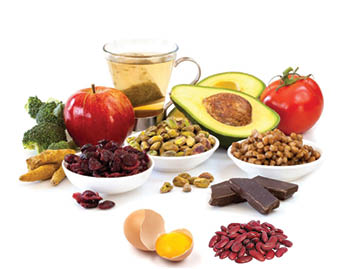
Nature has a wonderful way of letting us know when our mind-body complex is off-key. Some of the symptoms are: persistent fatigue, moodiness, sleep issues, unhealthy weight gain or loss, hair loss, inability to focus, blood sugar spikes, a low libido. All these are related to hormonal balance, which is key to helping us feel healthy and energised. Hormones are like chemical messengers in the body. Hormone-releasing glands (the Endocrine system) are spread throughout the body. These glands include the pineal, hypothalamus, pituitary, thyroid, par, thymus, adrenals, pancreas, ovaries and testicles. Hormones help regulate important life processes – such as reproduction, metabolism, sleep, blood pressure and heart rate.The endocrine system ‘thermostatically’ regulates hormone levels.Depletion of hormone-producing glands often leads to the onset of chronic diseases – for example, Type 2 Diabetes can be triggered by stressed out adrenals and a compromised pancreas. Heart disease, depression and cancers are also influenced by a weakened Endocrine system. Excessive fatty tissues in the body can act like Endocrine organs, producing more oestrogen in the body. By maintaining a healthy weight, an over-stimulation and hence overproduction of certain hormones can be avoided.
In sum, healthy Endocrine glands help ensure that the body gets adequate amounts of adrenalin, insulin, testosterone and oestrogen. Without these important hormones, our ability to handle stress, draw energy from food, bounce back swiftly and reproduce can be severely impacted. The thyroid is the largest Endocrine gland, and thyroid disease and inflammation can have a significant effect on the overall functioning of the Endocrine system. Along with an active lifestyle, diet is one of the best ways to influence a healthy balance, resulting in a better ability to handle stress, fight off infections and improve the overall quality of life.
Tip of the Week
It is important to curb the consumption of sugar, refined carbohydrates, alcohol, caffeine and dairy products, as all of these can wreak havoc on the Endocrine system. The body needs ‘real’, fresh food, which it intuitively knows how to process. On the contrary, ‘junk’ food products or hormone and antibiotic ridden meat products create chaos in the body. It is wise to buy organically grown produce. Eating plenty of fresh and lightly steamed vegetables is beneficial, as these contain minerals that prevent fatigue. While consumption of organ meats can be beneficial, this is conditional to having access to antibiotic free, hormone-free, range fed meats. Some traditional healing systems also use glandular extracts - especially those of adrenal, pituitary, thymus and pancreatic origin.
Nature’s Wonder Food(s) of the Week: Foods to promote Hormonal Health
A good starting point is a diet based on a variety of whole foods, ideally fresh and plant based. A high fibre content helps with a feeling of fullness and helpslower insulin levels naturally. Consumption of antioxidant-rich foods, like seaweed, grape seed extract, herbs and spices can fuel a healthy sleep cycle. Vital nutrients include fat-soluble Vitamins A, D, E & K, B Complex and Vitamin C. Some of the important minerals are zinc, chromium, selenium, magnesium, manganese, copper and potassium. Essential fatty acids - especially Omega 3 and 6 - are key. Amino acids, such as Alanine, Glycine &Dimethylglycine (DMG), and glutamic acid, are important too.
Examples of natural foods that help build a healthy & balanced hormonal system are:
Calcium, Vitamin A and Vitamin C rich foods: Carrots, broccoli, kale, parsley, turnip greens, collard greens, Swiss chard, egg yolk, oranges, grapefruit, cantaloupe, cherries, peppers and tomatoes
Magnesium rich foods: Blackstrap molasses, sunflower seeds, whole grains, almonds, pecans, hazelnuts, oats, brown rice, millet, white and red beans, wild rice, beet greens, lentils, lima beans and peaches
Manganese rich foods: wheat germ and bran, nuts (hazelnuts, pine nuts & pecans), mussels, oysters and clams, cocoa powder, dark chocolate, roasted pumpkin and squash seeds, flax seeds, sesame seeds and chili powder – as also cloves and saffron
Vitamin D (helps in the production of the thyroid hormone) rich foods: cod liver oil, organic eggs, fortified foods, mushrooms and oily fish (apart from sunlight, of course)
Selenium (aids the normal functioning of the thyroid) rich foods: organ meats, clams, grass-fed beef, pasture-raised pork, raw Brazil nuts, tuna, shrimp, sardines and wild-caught salmon
Iodine (essential for making thyroid hormones) rich foods: kelp, cod, wild-caught salmon, sardines, sea vegetables, scallops, shrimp, whole grains and yogurt – and of course iodised salt
Phytoestrogen rich foods (for helping to balance hormones) : flax seeds, sunflower seeds, bean sprouts, legumes such as garbanzo beans and peas; organic soya in moderate quantities (especially tofu, tempeh, miso and soya sauce) is also good.
In addition, certain herbs are considered beneficial for strengthening the liver and restoring glandular balance. A few examples are: alfa-alfa, black cohosh, capsicum, black radish extract, burdock root, goldenseal, Irish moss, liquorice, lobelia, lycopene, mullein, parsley, red clover and Siberian ginseng. Similarly, organic cacao nibs and coconut oil help in maintaining thyroid health. Organic goji berry stimulates the pituitary and pineal glands and organic maca stimulates the hypothalamus and pituitary glands, which in turn help stimulate the libido and fertility.
For Education purposes only; always consult a Healthcare Practitioner for medical conditions
Read More...